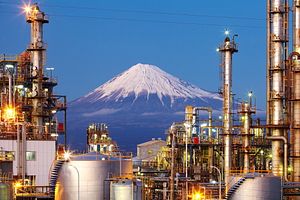Five years after the nuclear meltdown at Fukushima, public debates over nuclear power are still having an impact on Japan’s energy mix — and that, in turn, helps shape Japanese foreign policy. The Diplomat speaks with Jane Nakano, a senior fellow in the Energy and National Security Program at the Center for Strategic and International Studies, about the connection between Japan’s energy security concerns and its foreign policy decision making.
The Diplomat: What effect do you think the indictment and impeding trial of the three former TEPCO executives will have on the public debate in Japan over the future of nuclear energy? What other energy options does Japan have?
Nakano: The current public apprehension over, or opposition to, nuclear power generation in Japan seems to stem from their loss of trust in nuclear safety and governance. It is unclear as to what extent the indictment of TEPCO officials five years later may serve to restore the public confidence in nuclear safety and governance.
Diversification will remain to be the key in enhancing Japan’s sense of energy security. As fossil fuels will remain important in Japan, as in most of the industrialized economies around the world, Japan is focused on using natural gas—which is the cleanest type of fossil fuels—and advancing clean coal technologies while promoting the greater use of wind and solar.
How dependent is Japan on oil imports from the Middle East, and how does this shape Japan’s foreign policy approach to the region?
Since the Arab Oil Embargos in the 1970s, Japan has made a concerted effort to diversify the pool of energy supplier countries to Japan as well as the mix of energy sources. While Japan has succeeded in reducing its reliance on oil by introducing natural gas and nuclear energy, the country’s dependence on the Middle East remains relatively high. Consequently, the political and economic stability in the Middle East is of great importance to Japan. Japanese concern with Middle Eastern instability is reflected in Japanese provision of foreign aid in the forms of loans, grants and technical cooperation.
How does dependency on oil imports from the Middle East shape Japan’s response to China militarizing the South China Sea – an important trade route through which a lot of these oil imports pass through?
The South China Sea is where roughly two-thirds of Japan’s oil and gas imports transit, making the peace and stability in this body of water extremely important for Japan. (But note that roughly two-thirds of Japan’s gas imports come from outside the Middle East.) While Japanese policymakers likely appreciate a linkage between the country’s energy security and the stability in the South China Sea, I believe that they see the militarization as a challenge to a range of national security interests, of which energy security is only one among many.
The U.S. lifted its crude oil export ban last December, and Cosmo Energy Holdings Co. became the first Japanese firm to begin importing crude oil from the U.S. in mid-February. What effect is the lifting of the U.S. crude oil export ban likely to have on Japan’s import dependence?
The removal of crude oil export ban strengthens the global energy system by increasing the liquidity in global oil trade and by diversifying the pool of global crude exporters. Import-dependent Japan is among many countries that stand to benefit from this, but U.S. crude exports will not fundamentally address Japan’s energy import dependence challenge.
Japanese Prime Minister Shinzo Abe is expected to visit Russia for a meeting with President Vladimir Putin sometime in May – despite U.S. President Obama’s apprehension. How much is Japan’s determination to settle negotiations with Russia over the Northern Territories and peace treaty motivated by a desire to increase energy imports from and/or energy cooperation with Russia?
Japan and Russia are seemingly highly complementary in that Japan is a resource-poor country, while Russia is a close neighbor with a wealth of gas resources. In my view, however, Japan’s interest in expanding energy ties with Russia is driven by their political determination to settle the territorial issue as much as the country’s need for additional energy supplies. Japan appears to be counting on the centrality of energy exports for the Russian economy as a motivation for the Russian government to reconsider its stance on the territorial issue.
































